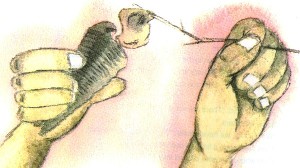
I - i
i- See main entry: wi-. verb prefix. Gram: 7th order of verbal prefixes - aspect begin, start.
-i- incorporated form 2. Gram: There is a link between this form and a following root or incorporated form: ngi- for class 1, ng- for class 3 and rr- for class 2. 1 • tree. See: taka; purinjirringa; -ma-. Wutatuwu yingwampa ngiya-mamanta, pi-ti-ri-ma-y-ajuwurtirri kangi a-ri-ma-j-i-kuwa-y-iti. As for my friends, they hid among bushes, among the fruit trees. Lit: where trees stand with fruit. yi-pi-rr-i-kimirna-mini ngatawa papuwaya he used to tie up the trees with barbed wire.
2 • container, boat, canoe, house, vehicle, car. See: -akili-; -akiji-; -ingikili-; -minti-; -ma-; -arumwi-; -ili-; wulijinga; kurrampali; mutika; tongulaka; kupunyi parra; kapala. Tayikuwapi nimarra watu-wunji-rr-i-kartingi-mi. Lots of people are talking inside the house. Ngiyatuwu a-mi-rra-ki-ma-j-i-ngi-mang-uri-pa He should bring the soup to me in the evening. Tayikuwapi nimarra watu-wunji-rr-i-kartingi-mi. Lots of people are talking inside the house. Ngiyatuwu a-mi-rra-ki-ma-j-i-ngi-mang-uri-pa He should bring the soup to me in the evening.
maji- in something. Morph: ma‑’with' +‑i‑’container'. Ninkiyi, kupunyi ji-p-ingartigi awinyirra tongulaka. Partuwa kipirla yi-ma-j-i-ngi-ja. Then he put the canoe in the water. After that he started to go out to the open sea in the boat. pi-rr-ati-yi-ma-j-i-ngi-m-am-ani they started going along in the boat in the morning. Pakinya ta-ma-j-i-mangi-rr-akinapugi mirrijini kangi mintini. First shake it (medicine in bottle).
3 • raw yam, kurlama ceremony. See: muranga. Ninkiyi, ngimp-atu-wuja kurlama ngimpi-nu-watu-wunga. ngimpi-ni-wati-ri-ma-j-i-y-akupawurli. Then we go to get the kurlama yam in the morning. We take the yam back in the morning. See: muranga.
 |
-igi Variant: -ugi. feminine verb root 2. extract, pull or take out. Syn: -ungwagi. See: -ajimwantirrigi; -kitikimi; -urruwa; pulim; tangwayi; pulimat; tikimati. Wiyika pi-ti-p-ajumwanji-rr-ig-ani They would pull out the innards. Kiyi, waya awungani pitiri-kuju-rr-umwarani. Kiyi, pitiri-kujungu-rr-ug-ani. Then they'd leave the wallaby in that to cook. Then they'd take it cooked out of the fire. Note: Picture by artist at Murripurtiyanuwu Catholic School Category: Change of position or state, Holding or transfer.
-igi See main entry: -ugi. intransitive verb root 2. do, be, use.
-igi See main entry: -amigi. verb suffix. cause to.
-ijilarlinga See main entry: -wijilarlinga. feminine verb root 3. 1 • paint dots, stripes etc.; write, print, type.
2 • rain lightly, sprinkle (with rain).
-iki- See main entry: -ikiri-. incorporated form 2. face.
-ikilarrapugi See main entry: -kilarrapugi. transitive verb root 2. poke in eye, look in eye.
-ikinyapa feminine verb root 2. be ready, stand ready. Syn: -apuligapa, -minagi, -mungimili. See: -ipiliga; -ipilingampa; -kunjingira; -wamungi; riti. Ninkiyi yi-p-ikinyapa, kayi ji-majayi jukwarliti, turli wurtimi awarra Nyingani. Then he stood ready and then aimed his spear at the little man and speared him. Category: Being, Adverbs.
-ikipi- incorporated form 2. bundle of spears. Syn: -irraami-. See: -kipi-.
-ikirapulimpa intransitive verb root 2. go across sky, stretch across. See: -apulipa. Puntaninga ampi-ji-rr-ikirapulimpa The rainbow is across the sky. Category: Sky, Environment.
-ikiri- Variant: -inkiri-; -iki-. incorporated form 2. face. See: yirrinkilingapa. See: yirrinkilingapa. See: yirrinkilingapa.
-ikirrawulari to have smiling face. Morph: ‑iki‑’face'‑awulari' ’climb'.
-ikirrawurlirriti face to be wrinkled.
 |
-ikirimirli Variant: -ukirimirli. transitive verb root 2. be angry (with), insult, be upset with someone. See: -akiriwurlingigi; -ikirimitiyarri; jirti; jurrimumi; jurrimumanyimi; -kurupwarri; mirliga; mwamawamini pitipita; pwalapi; yikwanari. pirripukirimirli they were angry. Api ngarra pi-rri-p-ukirimirli ngawa-yuwuni. Well they were angry with our older brother. Note: Picture from gallery of Picture It! Software Category: Feeling, Talking or thinking, Social behaviour.
 |
-ikirimitiyarri Variant: -ukirimitiyarri; -kirimitiyarri. intransitive verb stem 2/intransitive verb stem 1. Gram: + indirect object prefix get angry with someone, lose one's temper. Morph: ‑ikiri‑’face' +‑mitiyarri ’be rough'. Gram: It seems some people use -kirimitiyarri and some use -ikirimitiyarri. See: -akiriwurlingigi; -ikirimirli; jirti; jurrimumi; jurrimumanyimi; -kipiyawumi; -kurupwarri; mirliga mwamawamini; pitipita; pwalapi; yikwanari. a-p-ikirimitiyarra or a-ri-kirimitiyarri he gets angry. pi-ripu-kirimitiyarri they got angry with them. pirri-p-ikirimitiyarri kangi wuta-amini they got angry with their grandfather. Api awarra King Herod yu-wurt-ikirimitiyarri ngini ngarra yi-p-angiraga John the baptist. Well King Herod was angry at what John the Baptist said. Note: Photo from gallery of Picture It! Software Category: Feeling, Talking or thinking.
-ikirli intransitive verb root 2. be right there (of game), be in hole (of game). Jipipiti nimini ampu-nji-rr-ikirli. She peeped in and it was there in the hole. Category: Being, Position.
 |
-ikirrawulari intransitive verb root 2. have smiling face. Morph: ‑iki‑’face' +‑awulari ’climb'. See: -ajirupwaga; -marrimirnturrumwanga. amp-iki-rr-awulari he has a smiling face. Wuta pwakayinila yi-p-iki-rr-awulari. They had smiling faces. Note: Photo used with permission Category: Describing people or animals.
-ikirrawurlirriti intransitive verb stem 2. face to be wrinkled. Morph: ‑iki‑’face' +‑awurlirriti ’be tired'. Awinyirra Murtankala nyirra yirrinkilingampa ji-p-iki-rr-awurlirriti. Murtankala's face was wrinkled. Category: Body functions or actions, Describing people or animals, Physical qualities.
-ikirrigi transitive verb root 2. stand up something or someone, elect someone. See: -irrigi. Ngawa-amini awirankini pi-rri-p-ikirrigi. They elected a new pope. Category: Social behaviour.
-ikularigamugi transitive verb stem 2. cause to grow. Morph: ‑ikularigi ’grow?' +‑amigi ’cause'. Ques: I have included this in the dictionary as it was on a list of verb roots put together by Marie Godfrey. I have not found any examples of this (as yet) or of any root -ikularigi, without the CAUSATIVE suffix -amugi. verb roots ending in igi are normally a causative form on its own. Category: Change of position or state.
-ikunawurri- Variant: -ukunawuwurri-; -ukunawurri-. incorporated form 2. cry. Syn: -ilani-, -wutani-. See: -kiruwa; -ukuntirri; pirlinkiti. Pilikama ji-p-ikunawurri-mi? Why are you crying? Pilikama ji-p-ikunawurri-mi? Why are you crying?
-ikunawuwurrumwiyi cry.
-ikunawuwurri- See main entry: -ikunawurri-. incorporated form 2. cry.
 |
-ikunawuwurrumwiyi intransitive verb stem 2. cry. Morph: ‑ikuna(wu)wurru‑’cry' +‑mwiyi ’be thin'. Ques: It is not clear why the verb root -mwiyi is used here. Syn: -kiruwa, -ukuntirri, pirlinkiti -mi. See: -ilani-; -wutani-. pi-rri-pikunuwuwurru-mwiyi they (the babies) cried. Note: Photo by Maggie Smith - http://www.freedigitalphotos.net/images/view photog.php?photogid=172 Category: Feeling.
-ila Variant: -ula. intransitive verb root 2. do. Gram: Verb root which occurs with some free form verbs and other words such as yirrima 'to fly (of bird)' wanima 'trouble' See: -mi; -ma. Tokampuwi yirrima wu-p-ula kapi yinguka. Birds fly in the sky. Nyirratuwu wunijaka warlima ampi-ni-ri-ma-j-ila. The wind comes with power.
-ila See main entry: -pila. nominal suffix. belonging.to.
-ilani- incorporated form 2. cry. Syn: -ikunawurri-, -wutani-. See: -kiruwa; -ukuntirri; pirlinkiti. a-wu-j-ilani-y-akurluwunyi nyirra-mwarti She is watching her son cry.
-ilapwarrigi transitive verb root 2. hunt or work for someone else. in the sense of providing for someone. See: -amurrumi; -pirntirra-; -aputi-; -piningi-; -ingipiningi-; -kirintirrayi-; -majamurninga-; kularlaga. arnuka mwan-t-ilapwarrigi they don't work for us. arnuka mwan-t-ilapwarrigi they don't work for us.
-ilapwarrigiyamiya hunt or work for self. Category: Hunting or fishing, Working.
-ilapwarrigiyamiya reflexive verb stem. hunt or work for self. Morph: ‑ilapwarrigi ’work for someome else' +‑amiya ’self'. pi-rri-p-ilapwarrig-amiya They hunted for themselves. Category: Hunting or fishing, Working.
-ili- incorporated form 2. bark shelter (original meaning), house. See: -arumwi-; -ilipi-; -akiji-; -i-; -ma-; punkaringa; kurrampali; jampaka. Karri piti-p-ili-ja kurrampali api awungarra piti-p-ili-pirn-ani pili ngarra wurrungwarra yi-p-alangamiya-mini yilaruwu api awarra piti-p-ili-pirn-ani. When they would go to the house (of the dead person) they would hit the house here because his spirit had filled it, so they hit the house. Ngangi ngiya kurrampali ngi-ri-pujirr-amiya wuta karluwu piti-ma-t-ili-mwari ngiya-mamirampi. The house in which I shelter, well my children shouldn't leave it.
-ilijawiya See main entry: -ilipijawiya. Old Tiwi: feminine verb root 2, Modern Tiwi: intransitive verb root 2. sew cloth.
-ilikiparri See main entry: -ilikuparri. verb stem. houses on opposites sides (of road).
-ilikuparri Variant: -ilikiparri. verb stem. houses on opposites sides (of road). Morph: ‑ili‑’house' +‑kuparri ’be on opposite sides'. Syn: -arimukuparri. amp-ili-kuparri the houses are on opposite sides of the road. Category: Being.
-ilimaji- incorporated form 2. head. See: -matingi; -mirli-; pungintaga; tuwuluwa. Purrikiki ngarimi, ngamp-ilimaji-rr-awuriji pungintaga yilaruwu. We make a hole, putting our heads right inside it.
-ilinga transitive verb stem 2. get or find house (to live in). Morph: ‑ili‑’house' +‑wunga ’get'. Ninganuwanga karluwu kurrampali ji-j-ili-nga. He/she hasn't found (or got) a house to live in yet. Category: Living and housing.
-ilinganta- incorporated form 2. tin, container, bag, billycan, basket. See: -angi-, -i-; karlupuka, kilupi, panikini, wilijinga, palaji, wangatunga. Nyi-ta-y-ilinganta-wunyirri wulijinga kangi nyirra pitipita yilaruwu. Wash the inside of the billy. Ngintu-wa-j-ilinganta-y-amukurigi arramukuwapi pi-rri-min-t-ilinganta-y-akinya I put my billycan down and someone took it.
-ilingirri intransitive verb root 2. take turns. Nyirratuwu ampi-ri-mi, "Wanga marri nginjilatuwu-jarra, nginjilatuwu-jarra pili ngiyatuwu waya pirringawini," ampi-ri-mi. "Mu-wu-rra-p-ilingirri." She says, "You should take a turn for I'm tired," she says. We should take turns (at working). Category: Moving, Change of position or state.
 |
-ilinyawu intransitive verb root 2. shave, pull out whiskers. Syn: -irringwagi. pi-rri-p-ilinyawu they shaved, they pulled out their whiskers. Karri makatingari yima api awungarri yi-p-ilinyawu kumuti. At the end of the ceremony he pulled out his beard. Note: Photo from graur razvan ionut / FreeDigitalPhotos.net Category: Body functions or actions, Cutting or breaking or tearing.
-ilipi intransitive verb stem 2. be clothes. Gram: I have found this stem only in the expression below; the stem -ilipi is the incorporated form -ilipi- 'clothes' + the verb root: -pi, where the pi of the root is fused with the pi of the incorporated form. Gram: I have found this stem only in the expression below; the stem -ilipi is the incorporated form -ilipi- 'clothes' + the verb root: -pi, where the pi of the root is fused with the pi of the incorporated form.
wurriwurri -ilipi for clothes to be loose. Morph: wurriwurri 'shake' + verb with stem:‑ilipi. Gram: subject is 'she' wurriwurri amp-ilipi the clothes are loose. Category: Clothing and material.
-ilipi- Variant: -ingilipi-. incorporated form 2. paperbark (original meaning), clothes, cloth. See: -ingipi-; -ili-; punkaringa; punkaringini; punkarti; juma; juwuni; milawiyini; kurlugi; mipurra. Nganti-ri-ma-j-ilipu-nyay-ani maruti. We would find the crocodile's nest of paper bark. Ngi-rri-p-ilipi-nyaw-ani kangi kukuni. I threw the clothes in water. Ngiya ngirri-minj-imani nyi-ti-wunji-rr-ingilip-unga-mini I saw you taking my clothes.
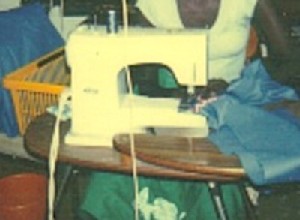 |
-ilipijawiya Variant: -ilijawiya; -ilipirtawiya. Old Tiwi: feminine verb root 2, Modern Tiwi: intransitive verb root 2. sew cloth. Morph: ‑ilipi‑’cloth' +‑wijawiya (‑wurtawiya) ’sew'. See: -pijawiya; -wurtawiya. pi-ti-p-ilipi-jawiya they sewed cloth. Pangarri nyirra wiyi amp-ilipijawiya awinyirra manipurruwa pili ji-p-ilipirtuwa awinyirra manipurruwa. Tomorrow she will sew her skirt because she tore it. Note: Photo by Jennifer Lee Category: Clothing and material, Working.
-ilipikijori intransitive verb stem 2. for clothes to be clean or damp. Morph: ‑ilipi‑’clothes' +‑kijori' be damp'. Ngawa ngamp-ilip-unyirri awinyirra kuluji api amp-ilipikijori We wash the clothes so they are clean. Category: Describing things.
-ilipirtawiya See main entry: -ilipijawiya. Old Tiwi: feminine verb root 2, Modern Tiwi: intransitive verb root 2. sew cloth.
-ilipurtuwa Old Tiwi: transitive verb root 2, Modern Tiwi: intransitive verb root 2. tear material, cloth. Morph: ‑ilipi‑’cloth' +‑purtuwa ’break'. See: -makanya. piti-p-ilipurtuwa they tore the material. Pangarri nyirra wiyi amp-ilipi-jawiya awinyirra manipurruwa pili ji-p-ilipurtuwa awinyirra manipurruwa. Tomorrow she will sew her skirt because she tore it. Category: Cutting or breaking or tearing, Working, Clothing and material.
-iliyangi- incorporated form 2. 1 • mussels, shellfish. See: jukwarringa; wurrukwati; -onji-; -punji-. Nyirratuwu ngangi pwaja wutiriyi awinyirra jangajikini ngamp-iliyangi-kirimi. The mussels with shells on we cook in a ground oven. ngamp-iliyangi-rr-alami kangi palaji We put the mussels into a bag.
2 • money. See: wurrukwati; kuwunawini; wurrupiya. Nuwatuwu yingompa wurrukotila nyimp-iliyangi-pungitayi Some of you keep thinking about money. "Ninkayi," yimi. "Kapi arnuka wurrukoti wu-t-iliyangi-ni, api yita nuwa waya awuta ngump-anyuwa api ngini ngimpi-timarti, api awungarri nginti-wunta-y-akirayi kuwinawini. "Listen," he said. "Those who do not have money well they are close to you so if you want, well you can give money to them." Nginingaji yingwampa wu-p-iliyangi-rr-amangi wurrukwati. For example some people will look after money.
-iliyarra See main entry: -wujiliyarra. transitive verb root 3. talk to someone, tell someone, talk for a long time.
-iluwa Variant: -uluwa. transitive verb root 2. give. Gram: Receiver as direct object Syn: -akirayi, ani2 -mi. pi-rri-p-iluwa they gave it to him. Nyu-wun-ta-luwa nuwa-morowi ngini wartiyanginila yinkiti pili ngarra awarra pupuni. Give your children bush foods because they are good. Ngiya-mantani yi-ni-mangu-rr-uluwa mirripaka amintiya ngiya karluwu ngi-ri-pungintayi ngiya-purnayinga amintiya ngiya-mamirampi. My friend gave me some beer and I did not think about my wife and children. Category: Holding or transfer, Social behaviour. Category: Holding or transfer, Social behaviour.
pitipituwu -iluwa be sorry for, pity, forgive. Morph: pitipituwu 'pity' + verb with root:‑iluwa 'give'. Syn: pitipituwu -akirayi. Ngiya pitipituwu ngu-wun-ta-luwa kakijuwi pili wuta-naruwi karluwu wu-t-amangi wuta-mwaruwi. I'm sorry for the children because mothers do not look after their children.
-imagi transitive verb root 2. know or recognise someone. See: -wamagi; -mungimajawu; -majawu; -mungurumi; -mingirripiligi; -ipiligi. pi-rri-p-imagi they knew him. Parlingarri awuta paparliwi pi-rri-wunt-imagi awuta kapi Larrikiya awungarruwu kapi jipampunumi. Long ago the ancestors knew the Larrikiyah mob at Jipampunumi (Darwin). Category: Talking or thinking.
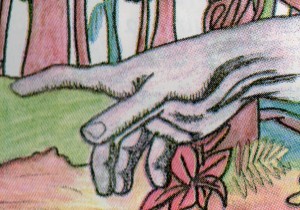 |
-imamaki Variant: -ajimamaki; -ajimamanki; -wurtimamaki; -wurtimamanki. transitive verb root 2. point at, select, pick out, accuse, judge. Gram: As with other verbs which have variations with the prefixes, aji- and wurti-, I have not been able to determine the reasons for these or the differences in meaning. See: -akanki, -marruwampurliya, -wanga; jira, -wungwayi, tongwayi. Api ninkiyi, yu-wuni-ki-j-imamaki awuta yuwurrajirrima, Peter wuta James amintiya john. Awuta yu-wuni-ki-jiyarra, yi-ki-mi ngini, "Nuwa awuta kapi nginaki nga-yi-ki-miki-ja," yikimi. So then he selected those three, Peter, James and John. He spoke to them, saying, "You come with me," he said. Gram: The 'evening' prefix ki- used throughout indicates that it took place in the evening. Partuwa, ngarra Kapijani yi-p-angiraga. Ngarra-mwaringa ju-wurtimamaki awinyirra. ju-wurtiyarra awinyirra ngarra-mwaringa, "Nginja awarra a-wu-rra-ma-rri-miringarra nginayi," yimi. After that, Kapijani made the announcement. He picked out his niece. He told his niece, "That one should marry you," he said. Ninkiyi, yoni yu-wuntiyarra ngarra-mamanta ngawa-yuwuni, yimi ngini, "Ngajiti nuwa-mamanta ngimpa-wun-t-ajimamaki yimpaja, pili ngwiyi wutilawatuwu pi-rri-ngan-t-ajimamaki," yimi ngawa-yuwuni. Then he spoke to them about something else, "Don't always judge your friends because later on they in turn may judge you," said our Older Brother. Note: Picture by artist at Murripurtiyanuwu Catholic School Category: Talking or thinking, Social behaviour.
-imamanki See main entry: -imamaki. transitive verb root 2. point at.
-imani See main entry: -umani. transitive verb root 2. see, look at, watch, observe.
-imanti- incorporated form 2. poisoned or polluted water. Syn: -waninga-. See: -mangi-; -imu-; -wunguriwi-; -wanti-; -artingi-; kukuni; majulungi; mangulumpi; atiwata; mangijirti mankirrijirti; makamuwa; mankwamini; mapajani; mipirranjini; papirantani. Waya ngwiyi jana yi-ngan-ta-pirni awi ji-niki-rr-imanti-rr-arawami You would become sick and you would die from that poisoned water.
-imi- incorporated form 2. see. See: -imiya; -umani. nginja ju-wa-ngi-rr-imi-y-amulijipa I thought you had disappeared on me. Lit: you disappeared on me in vain (but I saw you). Lit: you disappeared on me in vain (but I saw you).
-imiyangirri (1) see someone off, (2) miss out on. Morph: ‑imi‑’see' +‑angirri ’send'.
-iminangi- Variant: -imunangi-. incorporated form 2. get up, rise. See: -amarnipa; -ukularri; -amilipuri. Api nyi-rra-jirri militamuni api nyi-rra-y-imunangi-ntipagi parruwarti a-wu-rra-y-awurligi. Well take off your shoes and get up and shake them so that the dust falls off. Ngawatuwu pangarri nginti waya ngimpi-tumunji-rr-imunangi-miringarra. Tomorrow we will all get up and sit (waiting). Amintiya kapi wuni-p-imunangi-y-awuriji awungarruwu wutatuwu yingompa pirripiti. And those who were coming inside some of them stood up. Category: Moving.
-imingitiga See main entry: -imungitiga. transitive verb root 2. broadcast, tell others, gossip, tell or teach laws.
-imiya intransitive verb root 2. look at oneself. See: -ukirrimiya; -akurluwunyi; -ipiti; -umani; -akurlupuwunyi; -upuji; -apuji; -wiya; -angurupunya; -wujirra -kilurumi; -alimwanjigi; -anyiki; -kilarrapugi; -apu-; -akirli-; -kili-. Pi-rri-p-imiya kangi kukuni. They looked at themselves in the water. Category: Body functions or actions, Senses. Category: Body functions or actions, Senses.
jana + verb with root: -imiya feel sick. Morph: jana 'sick' + verb with root:‑imiya 'look at self'. jana yi-p-imiya he feels himself to be sick.
-imiyangirri transitive verb root 2. 1 • see someone off, see someone leave, see someone go past, let someone off. Morph: ‑imi‑’see' +‑angirri ’send'. pi-rri-p-imiyangirri they saw him leave. Awungarra pi-ri-mamiji. Ngiya waya ngi-rri-wun-t-imiyangirri. They went past here. I saw them go past. Ninkiyi, tayikuwapi pirri-wun-t-imiyangirri ngini pirri-p-awuriji kapi jupulunga, waya purru-wun-t-umagi wuta ngarra-mamanta, purru-wurtiyarr-ajirri ngini, "Yita wanga ngawa-yuwuni wuta ngarra-mamanta," pirimi. Then, many people saw them leave in a boat and recognised him and his friends and said to each other "It's our older brother and his friends," they said. Category: Social behaviour.
2 • miss out on, let go or skip something on purpose, such as a meeting. Yati wurlini ngimp-imiyangirri We'll skip one month (not have a meeting).
-imiyori intransitive verb root 2. be sorry about someone or something lost, grieve over or miss someone who has gone. pi-rri-p-imiyori they were sorry about someone or something lost. Category: Feeling.
-impirri Variant: -ipirri. transitive verb root 2. be unable to find something; lose sight of or miss something, mislay something. refers to something which is actually there. See: -amirigi; -apukurruwa; -apuwumpina. pi-rri-p-impirri they couldn't find it. Kularlaga yu-wa-ri-ma walimani api yi-p-impirri. He looked in vain for the axe but couldn't find it (even though it was there). Category: Change of position or state.
-imu- incorporated form 2. fresh water. See: -mangi-; -wunguriwi-; -majaki-; -wanti-; -artingi-; -imanti-; -waninga-; kukuni; majulungi; mangulumpi atiwata; malarlani; mapajani; mipirranjini; papirantani; mangipuranji; mankirripuranji mangijirti mankirrijirti; makamuwa; mankwamini; mankwamunga; kukwa; kutinga; makatinga; kilijini; yirringarni. Wutilatuwu yingwampa pi-nu-wa-j-imu -marri. The others tried to get fresh water over there.
-imujuma See main entry: -umujuma. transitive verb root 2. visit someone, see someone.
-imunangi- See main entry: -iminangi-. incorporated form 2. get up, rise.
-imungitiga Variant: -imingitiga; -ajimungitiga; -ajimingitiga. transitive verb root 2. broadcast, tell others, gossip, tell or teach laws. Gram: This is one of a number of verbs, which, as well as the base form, have variant forms with the prefixes aji- and wurti-. On some verb roots these actually seem to change the meaning of the root but with other verbs there does not appear to be any difference in meanings but the forms occur depending upon the preceding prefixes or the mood or aspect of the verb. I have not found any example of the -wurtimungitga form. Morph: ‑i‑+‑mingi‑’mind' +‑wutiga ’spread out'. Syn: -marruwayajingarla. See: -wungirri; -wayangirri; -angiraga; -wujiyarra; -wayakirayi; nimarra; -ipujingami; -wa-; -ipujinga-; -minta -mirra; -wungirrangiraga; -ajipiliga; -piliga; -kirripiliga; -mingirripiliga; -mingirrajipiliga; -waluwa wangilinjingini; -murripiliga; tijim; lernim. Ant: -wapujirra. Ninkiyi, yimi ngawa-yuwuni ngini, "Wangini ngini ngiya ngirramini, api nuwa ngwiyi awarra ngimpi-ri-ma-rru-wariyi kapi yoni murrakupupuni, ngumpu-wun-t-imungitiga," yimi. Then our older brother said, "Indeed my story, well you will take it to other countries and tell it to people," he said. Muwa-mamanta wun-t-ajimungitiga awarra nginingilawa ngirramini. Tell our friends my laws. Category: Talking or thinking, Social behaviour.
-inga nominal suffix. through, via, by, along. wartinga through the bush, overland. Morph: warta 'bush' +‑inga 'via'. tingatinga along the beach. Morph: tingata 'beach' +‑inga 'via'. yintulinga along the edge. Morph: yintula 'edge' +‑inga 'via'.
-inganti See main entry: -unganti. intransitive verb root 2. defaecate.
-ingarti See main entry: -ungarti. intransitive verb root 2. go into or under water, dive.
-ingartigi See main entry: -ungartigi. transitive verb root 2. put in water, soak something.
-ingartingi See main entry: -ungartigi. transitive verb root 2. put in water, soak something.
-ingikili- incorporated form 2. canoe. See: -i-; -akili-; -akiji-; kapala; tongulaka; mampini; mampunga; parra; kupunyi. nyimp-ingikili-y-akirtirruwa. you carry the canoe on your shoulder. Pi-ti-pi-ngi-kili-y-artig-ani kapi kirliwaga. They would put the canoe into the creek.
-ingila intransitive verb root 2. Gram: with wuji- ’CONTINUOUS’ be going along, be moving (as person or smoke blown by wind), (animal) moving along the ground (such as snake, long-necked turtle, centipede, snail), creep. See: -wuja. pu-rri-wuji-rr-ingila they were moving along. Ngarra yi-p-akurluwunyi awarra yikwani yi-nu-wuji-rr-ingila kapi warta. Then he saw a fire moving along towards him in the bush. Category: Moving.
 |
-ingilima feminine verb root 2. kneel. Gram: always with yimpula 'knee', Old Tiwi: + 'him' as indirect object prefix Ques: I am not sure if -ingilma is used with any other sense. Syn: fe Þ Modern_Tiwi: -amukuri yimpula yirrara kangi kuluwuni. Lit: put two knees down on ground. See: -ajirrigi; nil tan. Old Tiwi: yimpula piti-mi-rr-ingilima they knelt. Old Tiwi: Karri ngarra pirayi yimi kangi ngawa-rringani api yimpula ji-mi-rr-ingilima. When he prayed to our Father he knelt down. Old Tiwi: Ngarra yimpula ji-mi-rr-ingilima kapi awuta yuwurrara. He knelt down to those two. Note: Picture from 'Ngawurranungurumagi Nginingawila Ngapangiraga: Tiwi-English Dictionary' Category: Body functions or actions, Position.
-ingilipi- See main entry: -ungilipu-. incorporated form 2. running.
-ingilipi- See main entry: -ilipi-. incorporated form 2. paperbark, clothes, cloth.
-ingini- See main entry: -inginingi-.
-inginingi- Variant: -ingini-. incorporated form 2. eggs. Gram: The form -ingini- normally occurs before the root:fv:-kirimi. Syn: -atirri-. See: pajipajuwu; karaka; kulajuwu; karakini; karaparri; kirluwuka. Waya kakunukurluwi pi-ri-ma kiyi pajipajuwu jilikari pi-rri-wunji-rr-ingini-kirimi. They then became adults and made lots of eggs. Kapinaki kakirijuwi tokwampuwi a-p-inginingi-y-angintaya. These young birds break open the eggs.
-ingipi- Variant: -ungipu-. incorporated form 2. 1 • Stringybark. See: -ilipi-; -ili; jukwartirringa; milikipilinga; mulilinga; mintawunga; puringimparri; kurlugi; mipurra.
2 • grave post, cemetry post. Syn: -irruningi-, -marringili-. See: turtini; tamuni; ngampurruningiyiti. pu-ru-pu-rr-ingipi-y-apulipag -ani they used to block the way (by setting up) grave posts. Yingompa wawirruwi pi-ri-kirimi kurrampali, api purru-wunyawu natinga kartirrikani, pili pirr-a-ri-mi ngamparrimani jiringa. Wangini ngarra yoni ji-p-ungipu-nga awinyirra kartirrikani, ji-p-akilingimugi, pili papurli yi-kirimi kapi ngangatawa kurrampali ngangi a-yi-kirim-ami. Some men built a house and threw out a piece of timber, which they thought was no good. but another man chose that piece of timber and put it up to make a horizontal beam in the house he was starting to build.
-ingipinganti- Variant: -ingupunganti-. incorporated form 2. turtle, dugong. Gram: There is a link between this form and a following root or incorporated form: ngi- for class 1, ng- for class 3 and rr- for class 2. ngamp-ingipinganti-rr-alangimi kangi kapala we load the turtle into the boat. nga-ri-ma-j-ingipinganti-rr-apurti warta we take the dugong up to the bush. Api nginti-ni-ri-pirni awungarruwu jarrikarlani. Api kiyi nginti-ni-ri-maj-ingipinganti-rr-akupawurli. awungarra. Well we caught a turtle out there. And then we brought it back in the boat.
-ingipiningi- incorporated form 2. work. Syn: -piningi-, -kirintirrayi-, -majamurninga-, -pirntirra-. Ques: I am not sure of the differences between these various incorporated forms and their uses. See: -aputi-; -amurrumi; -ilapwarrigi. pi-rr-a-nti-rr-ingipiningi -y-apurti they went up to him for work but to no avail.
-ingira See main entry: -ungira. Old Tiwi: feminine verb root 2; Modern Tiwi: intransitive verb root 2. see (from distance), look around at, look for.
-ingirraga1 Variant: -irraga. transitive verb root 2. hit on head. Syn: -pungirraga, -pawurringipurugi. See: -matingirraga; -pungampuwa; -pungipa; -punkilarrapugi; -mirijigi; -matingiripwalintiya. Nginayi yi-nu-wunyawu api yi-min-t-ingirraga. That one threw it from over there and it hit me on the head. Category: Violence or impact, Body functions or actions. Category: Violence or impact, Body functions or actions.
(yi)jana -ingirraga have headache. Gram: direct object as experiencer + 'he' as subject (yijana 'sickness') Lit: sickness hits one on the head. a-min-t-ingirraga yijana I have a headache. Lit: pain hits me on the head.
-ingirraga2 See main entry: -wurtingirraga. transitive verb root 3. be mad, be silly.
-ingirri transitive verb root 2. bark at. Category: Body functions or actions.
-ingiwili- Variant: -unguwuli-; -ungiwili-; -iwuli-; -uwulu-. incorporated form 2. dog. Gram: There is a link between this form and a following root or incorporated form: ngi- for class 1, ng- for class 3 and rr- for class 2. See: pulangumwani; wankini; kitarringani; pamilampunyini; mirnuntini. a-wuni-ma-j-iwuling-uja he is bringing a dog.
-ingupunganti- See main entry: -ingipinganti-. incorporated form 2. turtle, dugong.
-ingwarlimi- incorporated form 2. wallaby spear. See: arati; arawinikiri; jalikaraji; jukwarliti; jurroringa; kayartirri; kulinjila; kurninjila; kutinikarri; miputikimi mungarlaka; murrukuwunga; numwariyaka; numwariyani; nurningini; nyingitinga; pijiwaya; pingawini tilipiringa; tongontilawu; tortinga; walanka; wulingaringa; yirrinkirliyati; -kipi-; -pwatijingi-; -wumurtiji-. Kurlinjila parlingarri pi-ri-ma-j-ingwarlimi -y-apirnag-ani. Long ago they used to sneak up with (wallaby) spears.
-inkiri- See main entry: -ikiri-. incorporated form 2. face.
-inkirrimiya See main entry: -ukirrimiya. reflexive verb stem 2. look at closely at, look in a mirror.
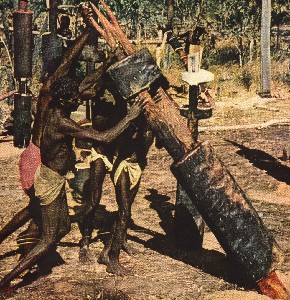 |
-intamigi Variant: -itamigi; -intamugi; -itamugi. transitive verb root 2. cause something/someone to stand up, erect; to elect or appoint someone; Morph: ‑inti ’stand' +‑amigi ’cause'. Gram: some irregularities in forms Syn: -irrigi. See: -apurtamigi; -inti. pi-rri-p-intamigi turtini they stood the grave pole up. Wuta tayikuwanga pirri-p-ili-y-intamugi kurrampali. They erected many houses. Note: Photo from ‘Expedition to the Land of the Tiwi’ by Charles Mountford; National Geographic March 1956 Category: Moving, Change of position or state.
-intamugi See main entry: -intamigi. transitive verb root 2. cause something/someone to stand up.
-inti Variant: -iti. intransitive verb root 2. stand, stand up, be or stay in one place, such as a house or tree. Gram: some irregularities of form Syn: fe Þ New_Tiwi: tayinti fe:with_or_without_Auxiliary_verb_with_root: -mi. See: -piyinti. Awungarruwu tiwi pi-rri-p-inti kapi milimika pili waya yoyi wi-yi-m-ami. They stood over there in the cleared place because they were about to dance. Awungarruwu yoyi wu-ri-mi kapi ampi-ji-rr-uruningi-y-inti. They dance over there where the grave posts are standing up. Kuta kamini a-wuni-pi-rr-iti ngwiyi. I don't know what will happen in the future. Lit: will stand in the future. Category: Being, Position. Category: Being, Position. Category: Being, Position. Category: Being, Position.
verb with root: -inti [name] for someone to be named or called [name]. Morph: verb with root:‑inti 'stand' + [name]. Gram: Old Tiwi: 'she' as 'dummy subject' + indirect object prefix for person named Lit: she [name] stood for that person. Awarra ngarra ji-mi-rr-inti John the Baptist. That man was called John the Baptist. Awungarra murrakupupuni ampungi-rr-iti Nguiu. This place is called Nguiu. Category: Talking or thinking.
pakumwara -inti be owned by one person or group, be exclusively owned. Morph: pakumwara 'alone' + verb with root:‑inti 'stand'. Gram: Old Tiwi: + indirect object prefix - as owner Wutatuwu pakumwara ampi-ripi-rr-akili-y-iti. It (car or boat) is theirs alone.
tuwara -inti have tail. Morph: tuwara 'tail' + verb with root:‑inti 'stand'.
-intipagi See main entry: -wuntipagi. transitive verb root 3. shake something or someone, rock baby.
-inyuki See main entry: -winyuki. transitive verb root 3. wait for.
-ipagi See main entry: -wuntipagi.
-ipaya Variant: -paya; fe Þ Modern_Tiwi: -apaya. intransitive verb root 2. finish, stop, end, cease doing something. Syn: -kururiyi, -majakururiyi. See: -amarntinya; -mirrinikila; -wamparri; -wapukinyimi; -wutuwiya; -wankiri-; pungilimpula; ayipa. pi-rri-p-ipaya they finished doing something. Ngarra waya yi-p-ipaya ngini ngarra yi-p-amurrumi api ngarra yu-wuriyi tangarima. When he finished his work he went home. Karri pakitiringa yi-p-ipaya, karri yirruwunari, kimirrakini wu-ri-kirimi. When the rain has finished, in the cold time, they burn off the country. Modern Tiwi: Karri jajirrima wumunga amp-apaya wuta awungarri wuwunga awinyirra kwaka, kiyi ngawa awungarri ngawapa awinyirra kwaka. When three days have finished then they take the Cycad Palm nuts, then we eat it. Category: Change of position or state.
-ipayamiya Variant: -payamiya. reflexive verb stem 2. Gram: Old Tiwi: May have indirect object prefix not retaliate or payback; to take something quietly; to surrender peacefully; to give in or give oneself up (as to police); Morph: ‑ipaya ’finish' +‑amiya ’self'. Ant: arntiruka -muwu, kurrukwala -ma; -piyajapurnimaya. pirri-p-ipayamiya they surrendered, they didn't retaliate. Wuta pu-rupu-payamiya. They didn't pay them back. Karri manjatawuwi pu-n-uriyi api awuta tiwi pu-rupu-payamiya kapi awuta manjatawuwi. When the police came they gave themselves up to them (without any trouble). Category: Talking or thinking, Social behaviour.
-ipi- See main entry: -upu-. incorporated form 2. mouth.
-ipiliga Old Tiwi: feminine verb root 2, Modern Tiwi: intransitive verb root 2. do nicely; to make/do something well; to make something ready. Syn: riti -kirimi. See: -apuligapa; -ikinyapa; -minagi; -mungimili; -ipilingampa; -kunjingira; -wamungi. pi-rri-p-ipiliga they did it nicely. Ngarra yi-p-ipiliga awarra kuluwuni kapi wuta yoyi wurimi. He made the ground nice where they were to dance. Awinyirra waranga ngangi piti-ri-kiyonji-ngi-matingi-rr-ipiligaimin-apa nyitawa ngangi jilamara-wurti awinyirra waranga. Those stones which they put up on top, are covered with all sorts of colourful designs. Category: Change of position or state, Working.
-ipiligi Variant: -upuligi. intransitive verb root 2. Gram: Old Tiwi: It may have indirect object prefix. glad or happy to see someone, recognise someone joyfully. See: -imagi; kukunari; miringayi; -ipiliga; -wujimpiligi. Karri ngarra-mamanta pi-n-uriyi api yi-rupu-rr-upuligi. When his friends came he was happy to see them. Category: Feeling, Talking or thinking. Category: Feeling, Talking or thinking.
-mingirripiligi recognise, be happy to recognise. Morph: ‑mingi‑’ear' +‑ipiligi ’be glad'. Kiyi kagi ngi-rru-wu-j-angurlimay-am-ani partuwa, kiyi ngi-ri-mungirripiligi waya pili waya. Then I recognised the place where I used to walk around.
-ipilingampa intransitive verb root 2. be ready, get ready (to go on a trip, to dance, or for a fight). Gram: only in past tense See: -apuligapa; -ikinyapa; -minagi; -mungimili; -kunjingira; -ipiliga; -wamungi; riti. pi-rri-p-ipilingampa they got things ready. Ngawa nginti-p-ipilingampa ngini waya nga-wuja kularlaga yinkiti. We got things ready to go hunting. Category: Change of position or state, Being.
-ipirri See main entry: -impirri. transitive verb root 2. be unable to find or mislay something.
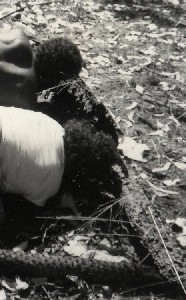 |
-ipiti intransitive verb root 2. look into, peek. See: -akurluwunyi; -ungira; -umani; -akurlupuwunyi; -alimwanjigi; -upuji; -apuji; -wiya; -akirli-; -kili-. pi-rri-p-ipiti they looked in. Ngawa nginti-p-ipiti kangi tingiwini, api karluwu nguntu-wunyayi awinyirra yilinga pili yartijanga yilaruwu. We peeped inside a hollow log but couldn't find a carpet snake because it was too dark. Note: Photo by Jennifer Lee Category: Body functions or actions, Senses.
-ipiti- incorporated form 2. lower arm. Syn: -ipungi-. See: yirrimpunga; yirripita; kurumuta; -kutu-; -mutu-. yi-p-ipit-awurra his arm broke.
-ipuji See main entry: -upuji. transitive verb root 2. look at.
-ipujigi transitive verb root 2. have regard for. Gram: The compile has it only with -ajirri 'each other' Ngawatuwu pitiwuripura ngini "Kama arnuka nga-ta-y-ipujig-ajirri?" The old people left that rule behind for us, (saying) "Why don't we have regard for each other?" Ngini warntirrana ngamp-amangi nginingawila manners amintiya kangawila piti-ri-wa-rumpura ngini nga-wu-rra-y-ipujigajirri api awarra warntirrana awungarruwu. If we mind our manners properly and the rules that our forebaers left behind for us, that we should have regard for each other, well that will be living properly. Category: Social behaviour.
-ipujinga- Variant: -upujinga-; -ipunjinga-. incorporated form 2. voice, talk. See: -wa-; pujinga; yirringa; miraka; nimarra; -angiraga; -wujiyarra; -wayakirayi; -ipujingami; -mi; -minta -mirra. wu-ri-ki-y-ipujinga-y-aningimarri they gather together to talk in the evening. Awungarruwu makirrana ngimpi-ni-ri-kuruwala kapi arnuka karrikuwani yi-ma-nguwun-ta-y-ipujinga-ya. There we sing loudly where no-one can look at us singing. "Karri nuwa piraya ngimpi-ri-mi kapi ngawa-rringani ngini kuriyuwu, api nuwa ngajiti ngimpa-wun-ta-y-ipujinga-kiringirri kapi wuta wa-ri-mamuliya papurajuwi," yimi ngawa-yuwuni. "When you pray to our Father who is above, well don't copy the talk of those who call themselves good," said our Older Brother. "Api awarra ngini ngirri-man-t-iyarra-mini, ngajiti awarra nyu-wa-ja-wa-mori. Awarra nyi-ngin-ta-y-ipujinga-pungintayi," yimi. Don't leave what I told you. Think about my words," he said. Karri ngiya ampu-ngi-rr-arawumi api awarra ngini nyi-ngin-ta-y-ipujinga-mi karri ngu-wuji-ngi-ma-rri-mapi-mili. When I die well, do what I say when I am a corpse. Lit: lying with paperbark.
-ipujingami intransitive verb stem 2. speak, talk, sing, use voice. Morph: ‑ipujinga 'voice' or 'talk' +‑mi 'do' or 'say'. See: -ipujinga-, -angiraga, -wujiyarra, -wayakirayi, -minta, -mirra, -wa-; nimarra. Ngini wu-ru-wayorri kuwunawini, api karluwu awuntakirayi kuwunawini. Ninkiyi, api awarra mu-rr-ipujinga-mi. When they ask him for money, he doesn't give it to them. So then they talk about him. Kuwa pi-rri-mi-rr-upujinga-mi ngawa-rringani They obeyed our father. Lit: they said yes to our father. Lit: they said yes to our father. Lit: they said yes to our father.
-ipujingami nginingaji makatinga ampirimangirrangiraga speak or sing well. Morph: verb with stem:‑ipujingami + nginingaji ’like' + makatinga ’river' + verb: ampi‑’she (NON PAST)’ +‑mangi‑’water’ +‑angiraga ’speak'. Lit: sing or speak like the sound of a river flowing. Nyimp-upujinga-mi nginingaji makatinga ampi-ri-mangi-rr-angiraga you sing/speak well, like a flowing stream. Category: Talking or thinking.
-ipujingami nginingaji ’goose' sing/speak with a bad voice. Morph: verb with stem:‑ipujingami + nginingaji ’goose'. Lit: sing/speak like a magpie goose. Ngarra yi-p-ujingami nginingaji mayimampi. He sang badly, like a goose. Nyirra ji-p-ujingami nginingaji pukumwaka. She sang badly, like a goose. Category: Describing people or animals.
-ipungi- Variant: -upungi-. incorporated form 2. lower arm. Syn: -ipiti-, -ipungi-, -kutu-, -mutu-. See: yirrimpunga; yirripita.
-ipunjinga- See main entry: -ipujinga-. incorporated form 2. voice, talk.
-ipurarrigi intransitive verb root 2. initiate/start a conversation, bother someone (with a problem). Ques: It seems that this applies to the more important person. "Karri ngiya ngimpi-ri-muku-muwu ngatawa, api ngiya karluwu ngu-ma-ta-y-ipurarrigi, pili ngarra ngatawa. Ngiya arnuka awarra nginta-kiyamama," yimi John the Baptist. "When He (Jesus) and I are together well I wouldn't start a conversation because he is more important. He and I are not equal," said John the Baptist. Category: Social behaviour, Talking or thinking.
-ipurunga intransitive verb root 2. for something to fill up. Anginaki wurika awinyirra waranga ampi-ri-ma-j-i-rr-ipurunga kukuni. Hollows in stones are filled with water. Category: Change of position or state.
-irraami- Variant: -irraamu-. incorporated form 2. bundle of spears. Morph: ‑i‑’tree?' +‑aami‑’bundle of wood'. Ques: I have only found this in Osborne, 1974 p49-50 Syn: -ikipi-. See: -ingwarlimi-; numwariyaka. a-wuji-ngi-ma-j-irraamu-muwu he is sitting with a bundle of spears.
-irraga See main entry: -ingirraga. transitive verb root 2. hit on head.
-irrakilingi- incorporated form 2. fire. See: -irrakirningi-. Kiyi yi-ni-ma-j-i-rr-akilingi-y-awurij-ani ngampi yoni rumi kagi yinkiti yu-wa-mini Then he used to take fire into another room where there was food and would burn it there.
-irrakirayi transitive verb root 2. for male to copulate with female. See: -akupurunga; -akupuringiti; -akupuringitigi; -ajuwura; -atingirrawura; -amukuri; -wungirlijingiga -ajiyarri; -majirripi; -mili; -wungirliji; ngirraripara; nyirrariparri; -awupurra -matingiripirtimi -kujurruwa; -kimili. Api ngarra anjora a-p-irrakirayi awinyirra arlitiwiyi api ninkiyi ngwiyi kurukura a-ri-kirimi ngatawa anjora. Api ngwiyi papuringata ampi-ri-ma ninkiyi a-wurtiyi pakijapura. Well the male wallaby copulates with the female wallaby and makes an 'egg', So then she later becomes pregnant and gives birth to a joey. Category: Social behaviour, Body functions or actions.
-irrakirli Variant: -irrakurli. intransitive verb root 2. commit adultery, have sex with wrong partner, play around with someone else's wife. Syn: -amanyirra2. See: mikikini; wulinjini. Ngarra jipajurupwaga api ngarra pirimani arrami yipirrakirli He was laughing (or smiling) at her so they said "Maybe he has committed adultery with her (or played around with her). Category: Social behaviour, Body functions or actions.
-irramwangigi Variant: -irromwangigi. transitive verb root 2. for a man to father a child, for a male be an uncle or for a female to be aunt to their brother's child. Syn: -irrortigi, -ortigi. See: yuwurtiyi; kakijuwi -kirimi. yu-wun-t-irramwangigi he fathered them. Nuwa kuwani yi-man-t-irramwangigi? Who fathered you (plural)? Category: Kinship, Social behaviour.
-irrangimurtigi Variant: -irrangimutigi. transitive verb root 2. pour out, tip out (from a container). Ques: This is probably -i- 'container' + -angimurtigi 'pour out' See: -angimurtigi; -akirruwa. pi-rri-p-irrangimurtigi they poured it out. Category: Change of position or state.
-irrangimutigi See main entry: -irrangimurtigi. transitive verb root 2. pour out, tip out (from a container).
-irranyu- Variant: -urranyu-; -irranyuwu-; -urranyuwu-; -urranyu-; -rranyuwu-. incorporated form 2. (whole) country, place, ground, land, area. See: -anyuwu-; -ma-; -pi-. Ngarra arnuka a-t-irranyu-wiya. He doesn't know the place. a-wu-j-irranyu-mwar-ami he is about to leave the area. Ji-p-irranyu-nyayi awarra nayi murrakupuni. She came across that country. Nginja ta-rranyuw-iya awungarruwu murrakupupuni Look for a place over there. Wutatuwu awunganuwanga yingompa arikutumurnuwi awungarruwu kuwinawini pi-ri-ma-j-iliyangi-rr-amang-ani. Api ngarratuwu awarra ngini yu-wa-ri-ma-j-iliyangi-rr-akilinga-mini api awarra ngarra ngawa-yuwuni yi-ma-j-iliyangi-rranyuwu-nyawu yakuluwuni. Likewise there were some people there who were in charge of money. The (tables) on which the money was, well Our Older Brother threw them to the ground.
-irranyukirruwa intransitive verb stem 2. miss one's step, stumble. Morph: ‑irranyu‑’place' +‑kirruwa ’miss'. See: -akupuraji, -awurligi, -akupuringinti, -alumi; pwapuwuwa, potan. Yi-p-irranyukurruwa kuluwuni karri ngarra yipangulimayi. He stumbled when he was walking. Category: Body functions or actions.
-irranyuwa intransitive verb root 2. be close together. Morph: ‑irranyuwu‑'place' +‑wa 'be'. See: -anyuwa yinkitayajirri. Ngimpala amp-irranyuwa. The branches are close together. Karri karrampi-mari awarra murrakupupuni. Yita wanga a-p-urranyuwa kapi ngarra ngawa-yuwuni japuja yi-ma-j-akuji-ngi-ma ngarra-mamanta. That country was not far away. It was close to where Our Older Brother lived with his friends . Category: Adverbs, Position, Direction or location.
-irranyuwi- See main entry: -irranyu-. incorporated form 2. (whole) country, place, ground, land, area.
-irranyuwiya transitive verb stem 2. look for a (suitable) place ( e.g.. to lie or sit down). Morph: ‑irranyuwu‑’place' +‑wiya ’look or'. pi-rri-p-irranyu-wiya they looked for a place. Nginja ta-rranyuw-iya awungarruwu murrakupupuni Look for a place over there. Category: Senses.
-irranyuwiyapija Gram: Old Tiwi: + 'him' as indirect object prefix; May have rri- 'away from camp'. take short cut, go straight ahead. Morph: ‑irranyuwu‑’place' +‑apija ’meet'. See: -apijingi; -apijingayi; jarrukati. pi-rri-mi-rring-irranyuwi-y-apija they went a short cut (or straight ahead). anti-rring-irranyuwi-y-apija Go the short cut! Gram: The rringi- form is the Stance prefix (found under pi-), which takes this form following the indirect object prefix. Category: Moving.
-irranyuwu- See main entry: -irranyu-. incorporated form 2. (whole) country, place, ground, land, area.
-irranyuwunga intransitive verb stem 2. reach (place). Morph: ‑irranyu‑’place' +‑wunga ’got'. pi-rri-p-irranyuwunga they reached a place. Wuta yuwurrara pirri-p-angulimayi pi-rri-p-irranyuwunga awungarruwu murrakupupuni. These two reached that place over there. Category: Moving, Change of position or state.
-irrapila Variant: -irrapirla. Old Tiwi: feminine verb root 2, Modern Tiwi: intransitive verb root 2. Gram: Old Tiwi : 'she' as subject; Modern Tiwi: 'he' as subject slip, be slippery; to go in easily; to slide. See: -apirla. jipirrapila it went in easily. Kiyi tangini nga-wunga, nga-wurtikirimi yilaruwu kangi tingati, api ngini amp-irrapila tangini, api awungarruwu karaka ngampi-nyayi. Then we get a stick and poke it into the sand. if the stick slips in easily, well it is there we find the turtle eggs. Karri awarra yirrikipayi papi arimi kuriyuwu kapi kukuni, api awarra mipurra a-p-irrapila kangi pijara. When the crocodile comes above the water the skin over its eyes slides back again. Category: Holding or transfer, Describing things.
 |
-irrigi 1 • transitive verb root 2. stand something up, erect something; to put somewhere. normally to do with placing things vertically or upright. Syn: -intamigi. See: -apurtamigi. wu-p-irrigi turtini they stand the grave post up. Kuluwurta yi-p-irrigi awarra kiyijini kangi ngarra-mamanta He stood that small boy up among his friends. Kapi ngawa nginti-p-irrigi jupulunga api ngintuwunyayi yingarti yinkiti. Where we put the boat we found plenty of food. Note: Photo from ‘Expedition to the Land of the Tiwi’ by Charles Mountford; National Geographic March 1956 Category: Change of position or state.
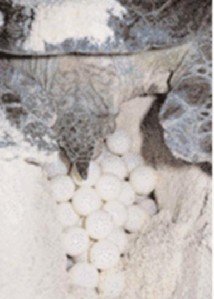 |
2 • Old Tiwi: feminine verb root 2. lay eggs. Lit: stand eggs up (in nest). Kitirika amp-irrigi pajipajuwu. A female turtle lays eggs. Note: Photo by Ian Morris in ‘Tiwi Plants and Animals’ p123 Category: Body functions or actions.
-irringagi See main entry: -irringwagi. Old Tiwi: feminine verb root 2. pull out whiskers, shave.
 |
-irringwagi Variant: -irringagi. Old Tiwi: feminine verb root 2. pull out whiskers, shave. Syn: -ilinyawu. See: -ungwagi. pi-ti-p-irringwagi they shaved. Karri ngarra-mirani jimirrarami api awungarri ji-p-irringwagi paluti. When his son died he pulled out his beard. Note: Photo from graur razvan ionut / FreeDigitalPhotos.net Category: Body functions or actions, Cutting or breaking or tearing.
-irriningi- See main entry: -irruningi-. incorporated form 2. grave posts.
-irromwangigi See main entry: -irramwangigi. transitive verb root 2. for a man to father a child.
-irrortigi Variant: -irrotigi; -urrortigi. transitive verb root 2. for a man to father a child, for a male be an uncle or for a female to be aunt to their brother's child. Syn: -irramwangigi, -ortigi. See: yuwurtiyi; kakijuwi. pi-rri-p-irrortigi they fathered him (a man and his brother). Ngarra yi-p-irrortigi awarra nginayi ngarra-mirani. He fathered his son. Nyirra yi-p-irrortigi awarra nginayi nyirra-mirani. She was aunt to her brother's child. Ngarratuwu ngini arringamini api ji-mi-rr-iti James. Ngarratuwu ngini yi-p-apunya api ngarratuwu John. Wuta- rringani ji-mi-rr-iti Jipitiyi. Awarra yu-wunt-urrortigi wuta ngarruwani. The older one's name was James. The younger one's name was John. Their father's name was Zebedee. He fathered the two brothers. Category: Kinship, Social behaviour.
-irrotigi See main entry: -irrotigi.
-irruma- See main entry: -irrumwa-. incorporated form 2. child.
-irrumwa- Variant: -irruma-. incorporated form 2. offspring, child (as son or daughter). See: -mwarti; -mwaruwi; -mirani; -mamirampi. "Wutatuwu tiwi, kapi wuta ngirimip-ajirri kapi natinga japuja a-ri-muki-ma, api ngini wu-ri-ma-j-irruma-warri, ngarratuwu ngarra-mamirampi amintiya ngarratuwu awunganuwanga ngarra-mamirampi, api karri wu-ru-warri, api karri ngwiyi wu-ri-muku-p-aya yipurrini api awungarri wu-pu-mor-ajirri," yimi ngawa-yuwuni. "Those who are related to each other and living in the one house, well if the children fight, one man's children fighting another man's, when they fight and later when they finish fighting, well then they will leave each other. "Wutatuwu tiwi, kapi wuta ngirimip-ajirri kapi natinga japuja a-ri-muki-ma, api ngini wu-ri-ma-j-irruma-warri, ngarratuwu ngarra-mamirampi amintiya ngarratuwu awunganuwanga ngarra-mamirampi, api karri wu-ru-warri, api karri ngwiyi wu-ri-muku-p-aya yipurrini api awungarri wu-pu-mor-ajirri," yimi ngawa-yuwuni. "Those who are related to each other and living in the one house, well if the children fight, one man's children fighting another man's, when they fight and later when they finish fighting, well then they will leave each other.
-irrumwakitirumi adopt a child. Gram: Masculine subject Morph: ‑irrumwa‑’child?' +‑kitirumi ’adopt'.
-irrumwakitirumi verb stem 2. Gram: Masculine subject adopt child. Morph: ‑irrumwa‑’child?' +‑kitirumi ’adopt'. Gram: In Old Tiwi it is only in the past tense if the child who was adopted is dead. If the child who was adopted is still alive there is still a parent-child relationship so non-past forms are used. In Modern Tiwi past forms can be used even if child is still alive. Syn: -pukulumagi. See: -kuturumi. Old Tiwi: a-p-irrumwakitirumi he adopted him/her/them. Modern Tiwi: Ngarra yi-p-irrumwakuturumi awarra nayi kiyijini karri ngarra-naringa ji-mi-rr-arawami. He adopted that little boy when his mother died. Category: Kinship.
-irruningi- Variant: -irriningi-; -urrunungi-. incorporated form 2. grave posts. See: -ingipi-; -marringili-; turtini; tamuni; ngampurruningiyiti. piti-p-irruningi-y-apurikaga-mini. They used to dance around where the grave posts were. wi-yi-ma-j-irruningi-y-angurlimay-ami They are starting to carry the grave post. Awinyirra jimitiriyi amp-irriningi-mijingali. That cemetery pole is nice.
-irtaputiya intransitive verb root 2/intransitive verb root 3. walk with (stick), lean on. See: -angurlimayi; -ajingi; -majakojigi; -pula. Api karri ngumpuwuriyi, api ngajiti yinkiti ngimpajamarruriyi. Awunganuwanga ngajiti kuwinawini ngimpajamarruriyi. Amintiya natinga ampirralipumuwu warlirringa. Ngajiti yinyonga ngimpajamajilipuriyi. Amintiya ngajiti wangatunga ngimpajamarruriyi. amintiya militamuni awurramuwu. Amintiya purinjiti ngini ngimp-irtaputiya. Well when you go don't take any food and likewise money. And wear one set of clothes. don't take another set. And don't take a bag. Wear shoes and take a stick to lean on when you walk. Category: Moving.
-irti- See main entry: -wurti-. incorporated form 3. 1 • because of something already happened or mentioned, resulting in.
2 • vegetable or fruit food, yam. See: -wingi-; -wa-.
-irtipi See main entry: -wurtipi. intransitive verb root 3. for something to crack; be cracked, split open, split up.
-irtipi- See main entry: -wurtipi-. incorporated form 3. footprints, track.
-irtuwa See main entry: -itiwa. transitive verb root 2. slit open, cut for blood-letting.
-itamigi See main entry: -intamigi. transitive verb root 2. cause something/someone to stand up.
-itamugi See main entry: -intamigi. transitive verb root 2. cause something/someone to stand up.
-iti See main entry: -inti. intransitive verb root 2. stand.
-itimarti See main entry: -wutimarti. intransitive verb root 3. want desire or like.
-itipayi intransitive verb root 2. sit with legs out. See: -muwu; -miringarra. ampu-wunji-rr-itipayi she is sitting with her legs out. Category: Position, Adverbs.
-itiwa Variant: -irtuwa. transitive verb root 2. slit open, cut for blood-letting. Syn: -punga. See: -makanya; -wurtipi. Awinyirra wurrukuliki karri kiyana, ngampi-ri-kiji-maripi-rr-itiwa. When the goose is cooked we slit open the chest with a stick. pirri-min-t-irtuwa they cut me for letting blood. ngirri-p-irtuw-amiya I cut myself. Category: Cutting or breaking or tearing.
-iwuli- See main entry: -ingiwili-. incorporated form 2. dog.
-iya See main entry: -wiya. transitive verb root 3. see, look at.
-iyajura Variant: -wurtiyajura; -wujiyajura. transitive verb root 3. tempt, urge or persuade someone to do something (wrong). Gram: When the root follows a direct object prefix ending in ni the i of the prefix is dropped and the root is -tiyajura and following the direct object prefix minyi- 'you (singular)' the i of the prefix is dropped and the root is -jiyajura. The form -wurtiyajura occurs directly following the subject-tense prefix when the direct object is 'him' or 'her'. In other cases the form is -jiyajura (which probably has the underlying class 3 root -wujiyajura (compare -wujiyarra) See: -wurturumagi; -wurtiyangirri; yoni punyipunyi. pu-rru-wurtiyajura they urged him to do something wrong. pi-ti-wurtiyajura they urged her to do something wrong. Ju-wa-r-itimarti ngini ju-wa-wun-t-iyajura matatawiwi ngini mwa-ri-pirni awarra John the Baptist. She wanted to persuade the guards to kill John the Baptist. Ngawa-yuwuni Jesus yu-wun-tiyarra ngarra-mamanta, "Ngajiti nyu-wa-j-iyajura tini ngini jirti a-wa-ja-kirimi." Our older brother Jesus told his friends, "Don't tempt a man to do wrong." Ninkiyi, yu-wuni-ja-ki-jiyarra awuta yuwurrajirrima, yikimi ngini, "Awi," yi-ki-mi. "Nyi-ta-waji-ngi-ki-kujingira, amintiya nyi-rra-ku-wayorri ngawa-rringani ngini a-mani-ku-wani ngini ngajiti kuwa ngump-anti-rra-ki-y-ipujinga-mi awarra mapurtiti ngini a-mani-ki-j-iyajura," yi-ki-mi. Then in the evening he in turn spoke to those three, saying, "Hey," he said, "Just be on your guard and ask our father to help you not to obey the Devil when he tempts you," he said. Category: Social behaviour, Talking or thinking.
-iyaka clitic. EMPHATIC. Gram: can occur on different parts of speech, but from the examples it is not clear what it means - probably a discourse level clitic; possibly the same as -aka Yita wanga nyonga, nyongiyaka it's another (possum). Yita wanga ngini kiyija ngurruwujingamini kuwunawiniyaka We have been reserving a little bit of money.
-iyakinapugi Variant: -ajiyakinapugi; -wurtiyakinapugi. transitive verb root 2. speak angrily to or growl at someone, speak violently. pirr-wurtiyakinapugi they spoke angrily to him. Nginja ngirramini ngimpu-nguwun-t-iyakinapugi. You speak angrily to us. Nyi-rr-ajiyakinapugi You (plural) growl at him. Category: Social behaviour, Talking or thinking.
-iyanga Variant: -anga; -yanga. nominal suffix. lots of, very, intensity. See: -la; -awamini; -awurti. paruwan-iyanga really hungry. kapi yinkit-iyanga where there is lots of food. karramp-iyanga really long way. mak-iyanga Where are they? arlipiw-iyanga lots of coconuts.
-iyarra See main entry: -wujiyarra. transitive verb root 3. tell, say to, talk to.
-iyawarli verb suffix. without warning, suddenly, straight away. a-p-ungwarl-iyawarli it rains without any warning. yi-mini-pungirrag-iyawarli he hit me on the head without warning. yi-min-t-angirr-iyawarli he pushed me (without warning). yi-mini-maripu-rr-awurt-iyawarli he pushed me in chest without talking. yi-mini-pirn-iyawarli he hit me without talking. ngirri-p-akiray-iyawarli I gave it to him straight away. payit-iyawarli they jump in quickly to fight. parlingarr-iyawarli ngiya karluwu pwangipwangi mngirrimani I have never smoked (from long ago to now). yilaruw-iyawarli (the dog went) straight under the house.
-iyawarntiyarri See main entry: -wiliyawarntiyarri. Old Tiwi: feminine verb root 3. be important , be powerful.